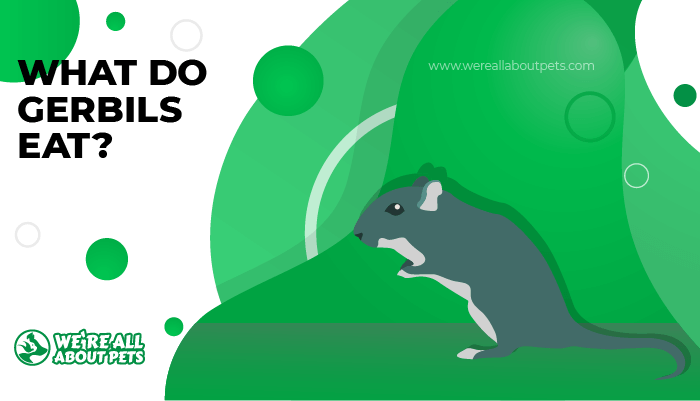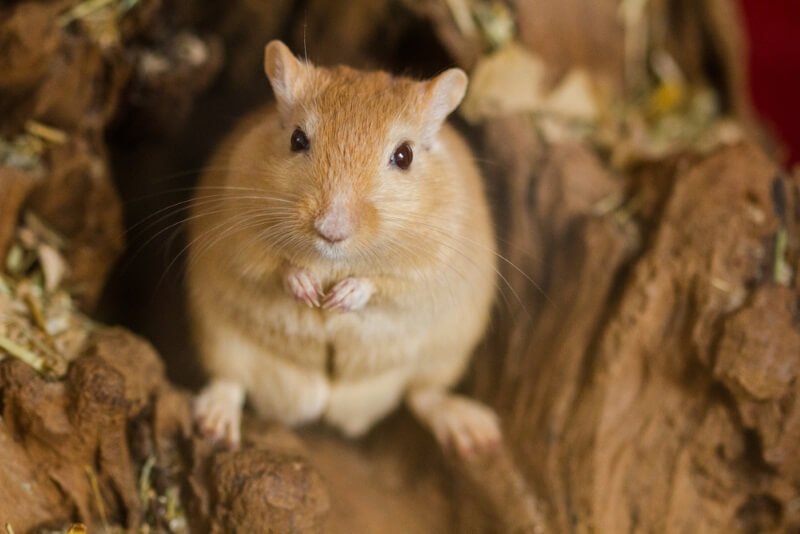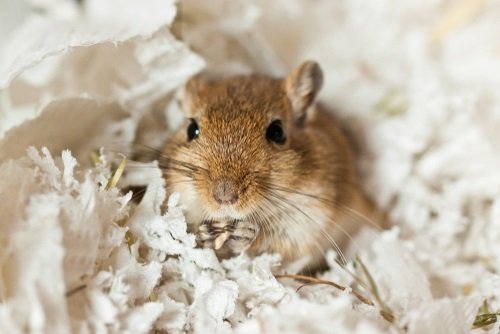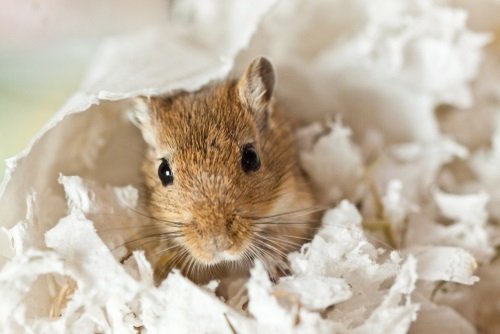What Do Gerbils Eat?
This page contains affiliate links. We may earn money or products from the companies mentioned in this post through our independently chosen links, which earn us a commission. Learn More

Small pets like the hamster and gerbil are often described as great options for children, but that isn’t always the case.
A gerbil is an energetic and entertaining pet, but it works best for older children who can handle the gerbil with care and manage the responsibility.
Gerbils are burrowing rodents native to Africa and Asia, where there are several wild breeds. Most of the gerbils you find in pet stores, however, are descendants from Mongolian gerbils.
These little rodents grow up to 4 inches long and get another 4 inches from their long, furry tails.
They are social animals, best kept in same-sex pairs, and they can become very tame with frequent handling. They typically don’t bite unless they feel threatened.
With proper care, a pet gerbil can live up to 8 years. In most cases, however, pet gerbils live 2 to 3 years.
The key to maintaining pet gerbil health and happiness is to provide your pet with a nutritious diet.
Read on to learn more about your gerbil’s nutritional needs and how to meet them in the best way possible.
Quick Navigation
Safe and Unsafe Foods for Gerbils

Wild gerbils are natural omnivores – they eat a variety of grasses, vegetables, fruits, leaves, and seeds. In captivity, however, a pet gerbil typically eats a commercial diet supplemented with fresh foods. As a gerbil owner, you are responsible for making sure that your gerbil gets the food he needs and nothing he doesn’t. Here’s a list of the foods that are and aren’t safe for your gerbil to eat.
Foods That Are Safe for Gerbils:
- Apples
- Bananas
- Melon
- Pears
- Kiwi
- Plums
- Strawberry
- Blueberry
- Broccoli
- Cherries (no pits)
- Cauliflower
- Cucumber
- Carrot
- Green beans
- Pumpkin
- Fennel
- Grass seeds
- Pumpkin seeds
- Sesame seeds
- Fresh herbs
Foods That Gerbils Can Eat in Moderation:
- Cooked chicken
- Eggs
- Grass hay
- Fruit twigs
- Lettuce
- Raspberry
- Sunflower seeds
- Sesame seeds
- Pecans
- Pistachios
- Almonds
- Peanuts
- Brazil nuts
- Popcorn
- Raisins
- Dried apricots
- Insects
Foods That Are Not Recommended for Gerbils:
- Red meat
- Sugary foods
- Cabbage
- Chocolate
- Citrus fruits
- Salted nuts/seeds
- Roasted seeds
- Cooked nuts
- Processed foods
Foods That Are Toxic or Harmful for Gerbils:
- Avocado
- Onion
- Garlic
- Raw potato
- Rhubarb
- Grapes
- Beans
- Fruit pits
- Fruit seeds
- Tomatoes
- Asparagus
- Zucchini seeds
Knowing what your gerbil can and can’t eat is only one half of the equation – you also need to understand his nutritional needs.
Read on to learn the essential components of your gerbil’s diet and to see our recommendations for feeding.
Types of Gerbil Diets
Many pet owners compare the gerbil to the hamster, but it’s important to realize that these are two different animals.
Though hamsters and gerbils are both technically omnivores, the gerbil prefers a vegetarian diet.
Your gerbil might do fine on a commercial hamster food, but his specific nutritional needs will be better met by a properly formulated gerbil mix.
Here is a quick breakdown of the different components of a pet gerbil’s diet:
- Seed Mixes – One of the most common gerbil foods, seed mixes contain a variety of seeds and grains, along with other ingredients like dried fruit and nuts. However, gerbils tend to pick out their favorite foods and leave the rest, leading to a possible nutrient deficiency.
- Balanced Pellets – A commercially balanced pellet is the best way to meet your gerbil’s minimum requirements for key nutrients, but some gerbils simply don’t like them – you may need to offer them along with a seed mix.
- Nuts & Seeds – If you’re feeding a commercially balanced pellet, nuts and seeds can be added as treats. Control your gerbil’s intake of high-fat options like cashews and sunflower seeds. The nuts and seeds should be uncooked and free of salt, seasonings, or other flavorings.
- Fruits & Vegetables – Fresh fruits and vegetables can make up a small part of your gerbil’s diet. Seed mixes and balanced pellets provide the majority of his nutrition. If you do feed your gerbil fruits and vegetables, wash them thoroughly and scrub them to remove dirt.
A balanced diet for gerbils is essential for optimal health and wellness. Keep reading to learn the basics about your gerbil’s nutritional requirements and how they can be met with a commercial gerbil mix.
Meeting Your Gerbil’s Nutritional Needs
When shopping for gerbil food, remember to keep your pet’s nutritional needs in mind. These are omnivorous animals, so they require a variety of foods in their diet.
The nutritional content of your gerbil’s food should come primarily from carbohydrates, with moderate protein content (about 15% to 16%) and low-to-moderate fat content (2% to 20%).
Younger and more active gerbils may need higher fat percentages to account for increased calorie burn.
Regarding specific nutrients, gerbils need high levels of fat-soluble vitamins like vitamins A, D, E, and K. These can be found in natural seeds and grains, so that’s why seed mixes are such a good diet for gerbils.
Choose a well-balanced seed mix, though, to avoid giving your gerbil too much fat. For example, pumpkin seeds and sesame seeds are recommended over sunflower seeds, because sunflower seeds have too much fat. Make sure that your gerbil’s food has a good blend of ingredients.
Gerbils don’t have significantly different nutritional needs based on age because they tend to live for only a few years. Baby gerbils, however, must be fed their mother’s milk or formula for the first three weeks of life.
After that, you can introduce small pieces of solid food, including commercial pellets and peeled sunflower seeds.
After a few months, your gerbil should be ready to eat a 50/50 mix of commercially balanced pellets and seed mix, with small amounts of fresh vegetables and fruits.
Occasional treats include boiled eggs, unsweetened yogurt, or dried mealworms or crickets.
To give you an idea of what gerbils eat and how much you should feed your pet gerbil during different life stages, refer to this chart:
Daily Guinea Pig Feeding Chart |
||||
| Age | Size | Pellets or Seed Mix | Veggies and Fruits | Treats |
| Up to 3 weeks | Baby | Mother’s milk or formula only | ||
| 3 weeks to 3 months | Juvenile | Small amounts of gerbil pellets, peeled sunflower seeds, raw oats | Very small amounts of fresh veggies and non-citrus fruit 1-2 times a week | |
| 3 months and up | Adult | Half commercially balanced pellets, half seed mix | Very small amounts of fresh veggies and non-citrus fruit 1-2 times a week | Boiled egg, unsweetened yogurt, dried mealworms |
| Pregnant and nursing mothers | Adult | Half commercially balanced pellets, half seed mix | Very small amounts of fresh veggies and non-citrus fruit 1-2 times a week | Boiled egg, unsweetened yogurt, dried mealworms |
Most gerbil owners offer their gerbil its food in a small, heavy bowl that can’t be knocked over. Some gerbils prefer to forage, so you might try sprinkling some food around the cage as well.
In addition to providing your gerbil with the right food, you also need to make sure that he has access to fresh water.
Gerbils don’t tend to drink a lot of water, but you should still provide it in a small water bottle hung where your gerbil can easily access it.
Recommended Commercial Gerbil Foods
If you’re not sure what to feed your gerbil, a commercial gerbil food could be the best option. These formulas are designed to provide for the nutritional needs of gerbils and are formulated for their digestive systems. Plus, they are convenient for you as a pet owner. It’s still important to choose a high-quality product, but you can rest assured that a good gerbil food mix will provide for your pet gerbil’s requirements.
Here are some of our top picks for the best foods for gerbils:
- Oxbow Essentials Hamster & Gerbil Food – Made with hand-selected timothy hay, this gerbil and hamster food is nutritionally complete and balanced in every bite.
- Kaytee FortiDiet Pro-Health Gerbil Food – Featuring large, crunchy pieces to support your gerbil’s health with chewing, this gerbil food also contains prebiotics and probiotics for healthy and regular digestion. Plus, it is naturally preserved for freshness.
- Tiny Friends Farm Gerri Gerbil Food – Nutritionally balanced and full of flavor, this gerbil seed mix promotes natural foraging behavior and promotes healthy skin and coat.
Looking for more recommendations on what to feed your gerbil? Check out our in-depth guide to the best commercial gerbil foods.
Gerbil Feeding FAQs
What do gerbils eat in the wild?
The gerbil is an omnivore in the wild but tends to prefer a vegetarian diet. They eat seeds, grasses, and vegetables, along with some fruits, leaves, and herbs. They will occasionally eat insects and small amounts of meat as well.
How much do gerbils eat?
Gerbils are very small rodents, so they don’t need a lot of food. Generally speaking, your gerbil will eat only about a tablespoon of food per day, with small amounts of fresh foods. Feed your gerbil at about the same time each day and remove any uneaten food before the next meal.
What do gerbils drink?
Gerbils drink water like any other animal but they don’t tend a drink a lot of it. The gerbil naturally comes from a very dry area of the world, so they typically get their water from the food they eat. Fresh food can help meet your gerbil’s needs for hydration, though you should provide a water bottle for clean water as well.
Do gerbils eat insects?
Wild gerbils are technically omnivores, so they may eat insects in the wild. If you want to include insects in a gerbil’s diet, dried mealworms could be a good option.









Liz Flynn
A really comprehensive guide to what gerbils can eat. I love that you have included the foods that are dangerous to gerbils. Many people think that because they are safe for humans to eat, they are fine for other animals.